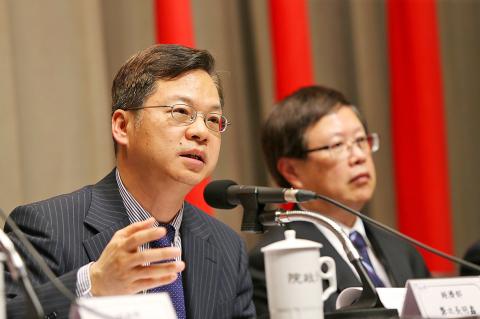Premier William Lai (賴清德) yesterday ordered the government to hasten its efforts to reach agreements with the US in response to the US’ planned tax reform, which could boost exports and help Taiwanese businesses reduce their reliance on China by relocating their investments to the US.
The US’ Tax Cuts and Jobs Act signed into law last year introduces reduced tax rates for businesses and individuals in a bid to spur economic growth, with its effects expected to be felt internationally.
However, the reform plan is forecast to have limited influence on Taiwan’s economy, a National Development Council analysis showed.

Photo: CNA
The tax cuts are expected to increase personal disposable income and spur domestic consumption in the US, which would stimulate Taiwan’s exports to the US in the short term, but whether it would turn into long-term export growth remains to be seen, the council said.
For every 1 percentage point growth of the US economy, there is a 0.15 percentage point increase in Taiwan’s exports and a 0.07 percentage point of growth of Taiwan’s economy, the council said.
The tax reform plan could influence the global strategy of large-scale Taiwanese businesses, prompting them to set up manufacturing bases in the US, but the policy’s affect on small and medium-sized enterprises would be limited, it added.
Taiwanese manufacturers, with a high-degree of automation, can adjust to the highest workforce costs in the US, the council said.
Major conglomerates such as Hon Hai Precision Industry Co, known as Foxconn Technology Group outside Taiwan, and Formosa Petrochemical Corp have announced large investment plans in the US in response to the tax reduction, the council said.
The US is Taiwan’s seventh-largest foreign investor, and most US businesses investing in Taiwan, such as Costco and Applied Materials, are tapping into the domestic market or supply chains, so they are not expected to withdraw from Taiwan back to the US, the council said.
The tax reform plan, coupled with a trade war between Washington and Beijing, could see Taiwanese businesses relocate from China to the US, Southeast Asian nations or back to Taiwan, thereby reducing Taiwan’s reliance on China, the council said.
Lai ordered the Cabinet to increase efforts to reach bilateral tax agreements with the US to eliminate trade barriers, such as double taxation, while increasing the mobility of personnel, capital, technology and merchandise.
Improvements have to be made to advance Taiwan’s investment environment amid a possible surge of international companies relocating to the US, Lai said.
To improve Taiwan’s competitiveness, a stable supply of electricity, water, land and skilled workers has to be maintained, while restrictions on financial laws have to be lifted to encourage private-sector investment, the council said.

‘DENIAL DEFENSE’: The US would increase its military presence with uncrewed ships, and submarines, while boosting defense in the Indo-Pacific, a Pete Hegseth memo said The US is reorienting its military strategy to focus primarily on deterring a potential Chinese invasion of Taiwan, a memo signed by US Secretary of Defense Pete Hegseth showed. The memo also called on Taiwan to increase its defense spending. The document, known as the “Interim National Defense Strategic Guidance,” was distributed this month and detailed the national defense plans of US President Donald Trump’s administration, an article in the Washington Post said on Saturday. It outlines how the US can prepare for a potential war with China and defend itself from threats in the “near abroad,” including Greenland and the Panama

The High Prosecutors’ Office yesterday withdrew an appeal against the acquittal of a former bank manager 22 years after his death, marking Taiwan’s first instance of prosecutors rendering posthumous justice to a wrongfully convicted defendant. Chu Ching-en (諸慶恩) — formerly a manager at the Taipei branch of BNP Paribas — was in 1999 accused by Weng Mao-chung (翁茂鍾), then-president of Chia Her Industrial Co, of forging a request for a fixed deposit of US$10 million by I-Hwa Industrial Co, a subsidiary of Chia Her, which was used as collateral. Chu was ruled not guilty in the first trial, but was found guilty

A wild live dugong was found in Taiwan for the first time in 88 years, after it was accidentally caught by a fisher’s net on Tuesday in Yilan County’s Fenniaolin (粉鳥林). This is the first sighting of the species in Taiwan since 1937, having already been considered “extinct” in the country and considered as “vulnerable” by the International Union for Conservation of Nature. A fisher surnamed Chen (陳) went to Fenniaolin to collect the fish in his netting, but instead caught a 3m long, 500kg dugong. The fisher released the animal back into the wild, not realizing it was an endangered species at

DEADLOCK: As the commission is unable to forum a quorum to review license renewal applications, the channel operators are not at fault and can air past their license date The National Communications Commission (NCC) yesterday said that the Public Television Service (PTS) and 36 other television and radio broadcasters could continue airing, despite the commission’s inability to meet a quorum to review their license renewal applications. The licenses of PTS and the other channels are set to expire between this month and June. The National Communications Commission Organization Act (國家通訊傳播委員會組織法) stipulates that the commission must meet the mandated quorum of four to hold a valid meeting. The seven-member commission currently has only three commissioners. “We have informed the channel operators of the progress we have made in reviewing their license renewal applications, and